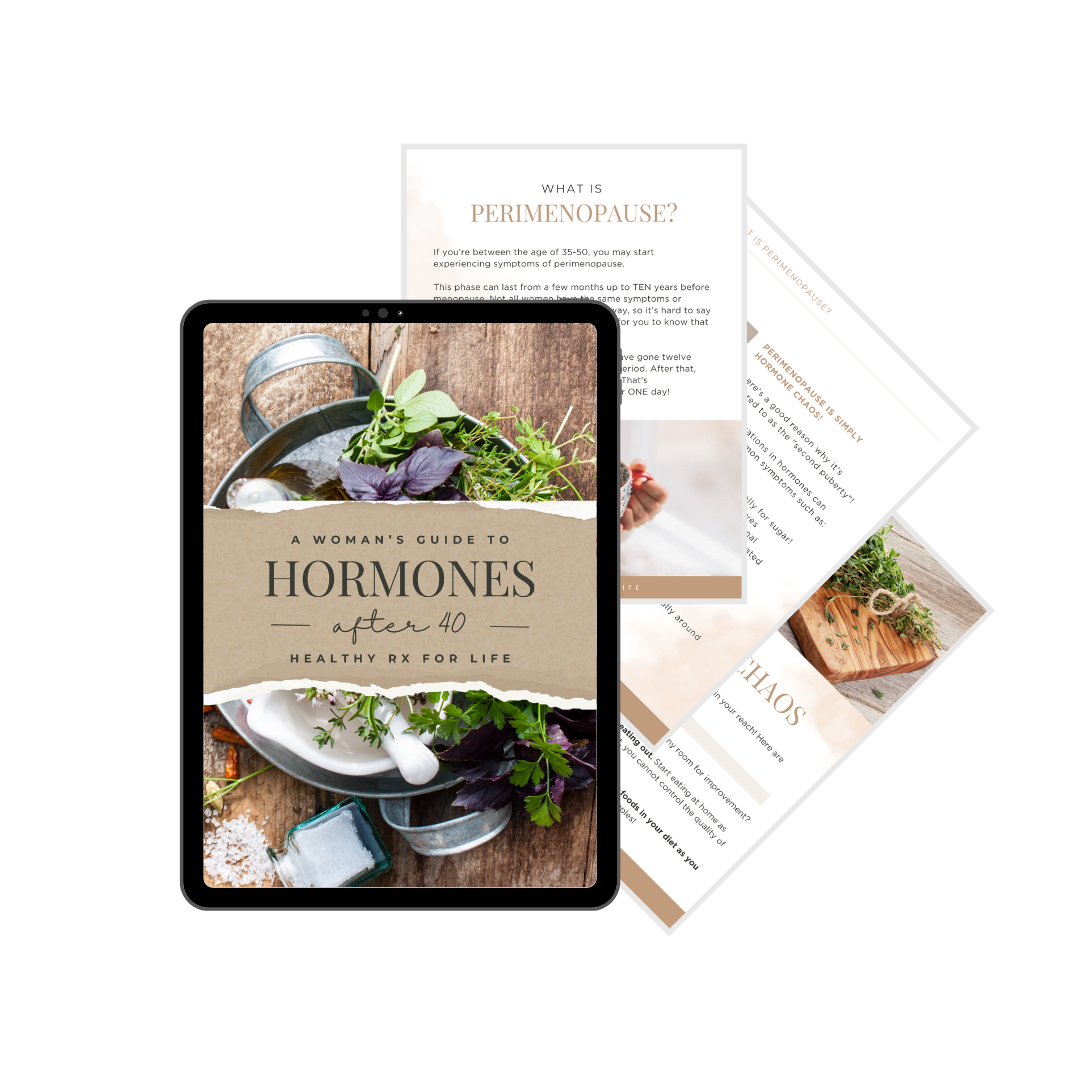Have you ever noticed how your digestion, mood, and even skin can feel totally different from one day to the next?
As we enter perimenopause, these shifts can feel even more dramatic. Our hormones are changing, which brings on its own set of challenges, but did you know that one of the biggest factors influencing hormone health is actually in your gut?
That’s right!
The gut microbiome—often referred to as your “second brain”—plays a huge role in managing hormone balance, especially during perimenopause.
In this article, we’ll explore what the gut microbiome is, why it matters for hormone health, and how an imbalanced microbiome can create symptoms we may not even associate with gut health. Plus, I’ll give you simple but powerful ways you can support a healthy gut!
What Is the Gut Microbiome?
The gut microbiome is a complex community of trillions of bacteria, viruses, fungi, and other microorganisms that live in our digestive tract. While it might sound strange to have so many microbes living in our bodies, they’re actually essential for our health. These tiny organisms help us digest food, make essential vitamins, and even support our immune system.
Most of our gut bacteria are beneficial, but there needs to be a balance. When the “good” bacteria are thriving, they help keep the “bad” bacteria in check. But when this balance is thrown off—a state called dysbiosis—we can start to experience a range of health issues, from digestive discomfort to immune challenges and hormone imbalances.
During perimenopause, our gut microbiome is even more critical, as it can directly affect the hormones that help us feel balanced and well.
Meet the Estrobolome: The Gut’s Connection to Estrogen
An especially important part of the microbiome for women in perimenopause is the estrobolome. The estrobolome is a subset of gut bacteria that metabolizes and regulates estrogen. These bacteria produce enzymes that help process estrogen and remove it from the body when it’s no longer needed.
When the estrobolome is balanced, it helps maintain healthy estrogen levels, but if it’s disrupted, estrogen can build up or be eliminated too quickly. This imbalance can lead to symptoms commonly associated with perimenopause, such as mood swings, weight gain, and even worsening PMS. So if we want to keep our hormones working for us, maintaining a healthy estrobolome is essential.
Functions of the Gut Microbiome
The gut microbiome has a wide range of functions that impact our whole body, including our hormones. Here are a few of its key roles:
Hormone Regulation
The microbiome doesn’t just affect estrogen; it can also influence cortisol (stress hormone), thyroid hormones, and insulin. This regulation helps keep our energy, mood, and even weight stable.
Immune Support
A large part of our immune system is in our gut. By supporting immune health, the microbiome helps reduce inflammation—a major factor in hormone imbalances.
Mental Health
Gut bacteria produce neurotransmitters like serotonin, which can influence our mood. In perimenopause, when hormone shifts can already impact mental health, supporting the gut can be an added way to stabilize mood.
Digestive Health
Digesting food well means our body absorbs the nutrients needed to make hormones. A healthy microbiome supports efficient digestion, so you’re getting the most out of the food you eat.
These functions are especially important during perimenopause, when our bodies are changing and adapting. A well-functioning microbiome can make this transition smoother and less symptomatic.
Common Symptoms of Imbalance
When our gut microbiome is out of balance, we may experience various symptoms, many of which overlap with perimenopause.
Here are some common signs:
Bloating and Gas
If your digestion feels off, it could be a sign that your gut bacteria are out of sync.
Mood Swings and Anxiety
Since the gut helps produce neurotransmitters, dysbiosis can worsen mood-related symptoms.
Hormone-Related Issues
PMS, irregular periods, and hot flashes may feel more intense with an imbalanced microbiome.
Sugar Cravings
Certain gut bacteria feed on sugar, so when they’re out of control, you might notice an uptick in cravings.
Fatigue
When digestion and nutrient absorption are impaired, you may feel chronically tired.
These symptoms can seem like just “part of perimenopause,” but addressing gut health could ease their intensity.
What Disrupts the Microbiome?
Several factors can throw our gut microbiome off balance, and some of them are particularly common during perimenopause:
Antibiotics
Antibiotics kill both good and bad bacteria, which can lead to long-term imbalances.
High-Sugar or Processed Foods
Diets high in sugar or refined carbs feed harmful bacteria, allowing them to crowd out the beneficial ones.
Chronic Stress
Stress doesn’t just impact our mood; it can affect gut health too! High cortisol levels alter the microbiome, making it more prone to dysbiosis.
Lack of Fiber
Fiber is fuel for good bacteria, so a low-fiber diet may limit their growth.
Poor Sleep
Believe it or not, sleep plays a role in gut health. A lack of quality sleep disrupts the microbiome’s natural rhythms, contributing to imbalance.
Identifying these disruptors can help us take steps to protect our gut health, which in turn supports balanced hormones.
Food and Lifestyle Habits to Improve the Gut Microbiome
The good news is that there are many simple, natural ways to support a healthy microbiome and, by extension, healthier hormone levels. Here are some tried-and-true tips:
Eat More Fiber
High-fiber foods like fruits, vegetables, whole grains, and legumes feed beneficial bacteria. Aim for a variety of colors on your plate to get different types of fiber.
Incorporate Fermented Foods
Foods like yogurt, kefir, sauerkraut, and kimchi are packed with probiotics (beneficial bacteria). These foods can boost your gut health and even support the estrobolome.
Prioritize Prebiotics
Prebiotics are fibers that act as food for probiotics. You can find prebiotics in foods like garlic, onions, leeks, asparagus, and bananas.
Reduce Sugar and Processed Foods
Minimizing sugar and processed food intake can prevent harmful bacteria from overgrowing, which supports a balanced microbiome.
Manage Stress
Stress relieving practices like meditation, deep breathing, or yoga can help reduce cortisol levels, protecting your gut health. Remember, stress management is key not just for your mood but for your gut, too.
Get Quality Sleep
Aim for 7-9 hours of quality sleep per night. Quality sleep helps your body reset, giving your gut microbiome time to thrive.
By nourishing your microbiome with the right foods and lifestyle habits, you’re setting yourself up for a smoother transition through perimenopause. A healthy gut means more stable hormones, improved mood, and overall better health.
In Summary
The gut microbiome may be tiny, but its impact on our health is enormous, especially during perimenopause.
By caring for your gut—through a fiber-rich diet, fermented foods, stress management, and good sleep—you can support a balanced microbiome that, in turn, helps stabilize your hormones. Instead of feeling like you’re at the mercy of hormone swings, think of this as a time to empower yourself through nurturing habits that help your gut and body thrive.
Remember, small, consistent changes can make a big difference! Start with one or two tips that feel doable for you and build from there. With the right support for your microbiome, you can feel more balanced and resilient throughout perimenopause and beyond.






